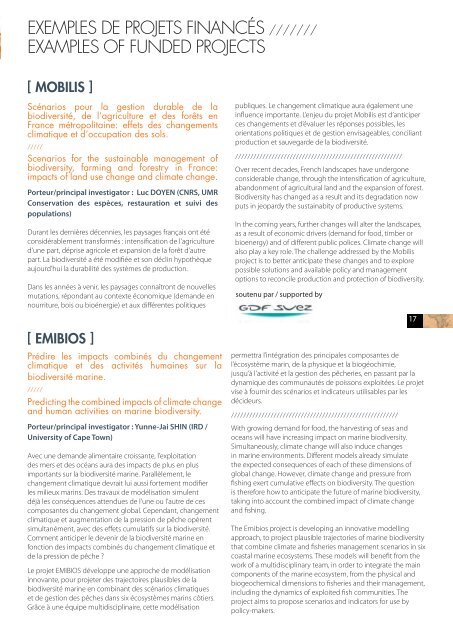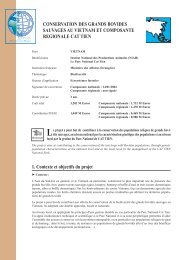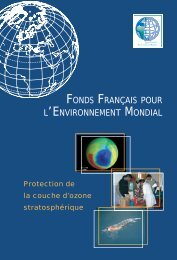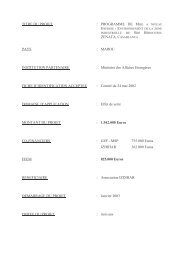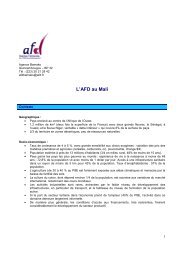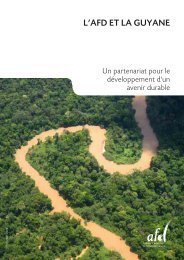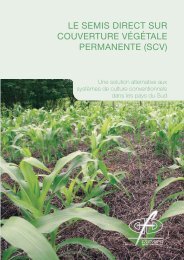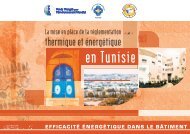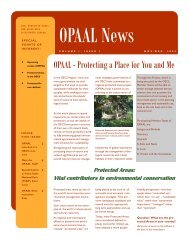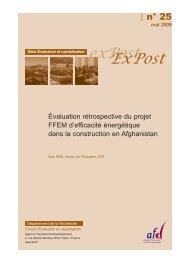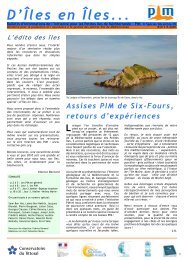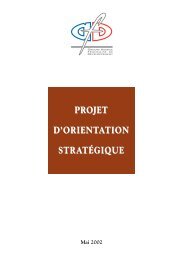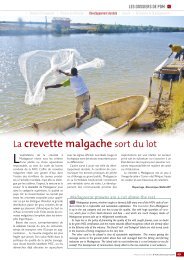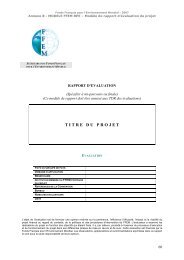SCÉNARIOS DE LA BIODIVERSITÉ AFRICAINE ... - FFEM
SCÉNARIOS DE LA BIODIVERSITÉ AFRICAINE ... - FFEM
SCÉNARIOS DE LA BIODIVERSITÉ AFRICAINE ... - FFEM
Create successful ePaper yourself
Turn your PDF publications into a flip-book with our unique Google optimized e-Paper software.
EXEMPLES <strong>DE</strong> PROJETS FINANCÉS ///////<br />
EXAMPLES OF FUN<strong>DE</strong>D PROJECTS<br />
[ MOBILIS ]<br />
Scénarios pour la gestion durable de la<br />
biodiversité, de l’agriculture et des forêts en<br />
France métropolitaine: effets des changements<br />
climatique et d’occupation des sols.<br />
/////<br />
Scenarios for the sustainable management of<br />
biodiversity, farming and forestry in France:<br />
impacts of land use change and climate change.<br />
Porteur/principal investigator : Luc DOYEN (CNRS, UMR<br />
Conservation des espèces, restauration et suivi des<br />
populations)<br />
Durant les dernières décennies, les paysages français ont été<br />
considérablement transformés : intensification de l’agriculture<br />
d’une part, déprise agricole et expansion de la forêt d’autre<br />
part. La biodiversité a été modifiée et son déclin hypothèque<br />
aujourd’hui la durabilité des systèmes de production.<br />
Dans les années à venir, les paysages connaîtront de nouvelles<br />
mutations, répondant au contexte économique (demande en<br />
nourriture, bois ou bioénergie) et aux différentes politiques<br />
[ EMIBIOS ]<br />
Prédire les impacts combinés du changement<br />
climatique et des activités humaines sur la<br />
biodiversité marine.<br />
/////<br />
Predicting the combined impacts of climate change<br />
and human activities on marine biodiversity.<br />
Porteur/principal investigator : Yunne-Jai SHIN (IRD /<br />
University of Cape Town)<br />
Avec une demande alimentaire croissante, l’exploitation<br />
des mers et des océans aura des impacts de plus en plus<br />
importants sur la biodiversité marine. Parallèlement, le<br />
changement climatique devrait lui aussi fortement modifier<br />
les milieux marins. Des travaux de modélisation simulent<br />
déjà les conséquences attendues de l’une ou l’autre de ces<br />
composantes du changement global. Cependant, changement<br />
climatique et augmentation de la pression de pêche opèrent<br />
simultanément, avec des effets cumulatifs sur la biodiversité.<br />
Comment anticiper le devenir de la biodiversité marine en<br />
fonction des impacts combinés du changement climatique et<br />
de la pression de pêche ?<br />
Le projet EMIBIOS développe une approche de modélisation<br />
innovante, pour projeter des trajectoires plausibles de la<br />
biodiversité marine en combinant des scénarios climatiques<br />
et de gestion des pêches dans six écosystèmes marins côtiers.<br />
Grâce à une équipe multidisciplinaire, cette modélisation<br />
publiques. Le changement climatique aura également une<br />
influence importante. L’enjeu du projet Mobilis est d’anticiper<br />
ces changements et d’évaluer les réponses possibles, les<br />
orientations politiques et de gestion envisageables, conciliant<br />
production et sauvegarde de la biodiversité.<br />
///////////////////////////////////////////////////////<br />
Over recent decades, French landscapes have undergone<br />
considerable change, through the intensification of agriculture,<br />
abandonment of agricultural land and the expansion of forest.<br />
Biodiversity has changed as a result and its degradation now<br />
puts in jeopardy the sustainabity of productive systems.<br />
In the coming years, further changes will alter the landscapes,<br />
as a result of economic drivers (demand for food, timber or<br />
bioenergy) and of different public polices. Climate change will<br />
also play a key role. The challenge addressed by the Mobilis<br />
project is to better anticipate these changes and to explore<br />
possible solutions and available policy and management<br />
options to reconcile production and protection of biodiversity.<br />
soutenu par / supported by<br />
17<br />
permettra l’intégration des principales composantes de<br />
l’écosystème marin, de la physique et la biogéochimie,<br />
jusqu’à l’activité et la gestion des pêcheries, en passant par la<br />
dynamique des communautés de poissons exploitées. Le projet<br />
vise à fournir des scénarios et indicateurs utilisables par les<br />
décideurs.<br />
///////////////////////////////////////////////////////<br />
With growing demand for food, the harvesting of seas and<br />
oceans will have increasing impact on marine biodiversity.<br />
Simultaneously, climate change will also induce changes<br />
in marine environments. Different models already simulate<br />
the expected consequences of each of these dimensions of<br />
global change. However, climate change and pressure from<br />
fishing exert cumulative effects on biodiversity. The question<br />
is therefore how to anticipate the future of marine biodiversity,<br />
taking into account the combined impact of climate change<br />
and fishing.<br />
The Emibios project is developing an innovative modelling<br />
approach, to project plausible trajectories of marine biodiversity<br />
that combine climate and fisheries management scenarios in six<br />
coastal marine ecosystems. These models will benefit from the<br />
work of a multidisciplinary team, in order to integrate the main<br />
components of the marine ecosystem, from the physical and<br />
biogeochemical dimensions to fisheries and their management,<br />
including the dynamics of exploited fish communities. The<br />
project aims to propose scenarios and indicators for use by<br />
policy-makers.


